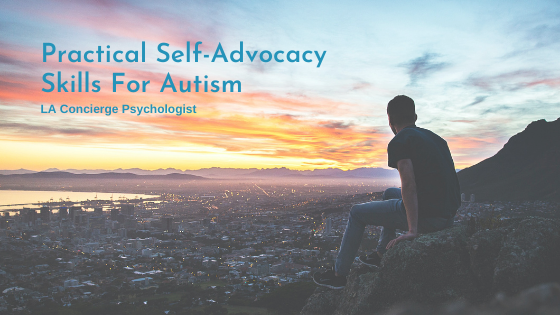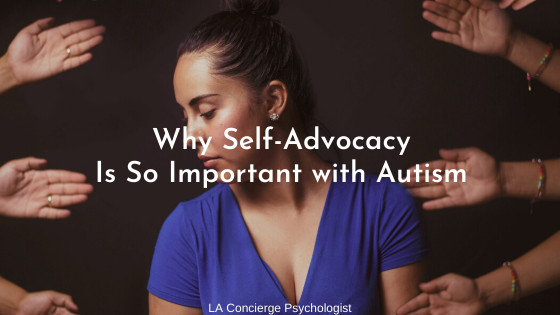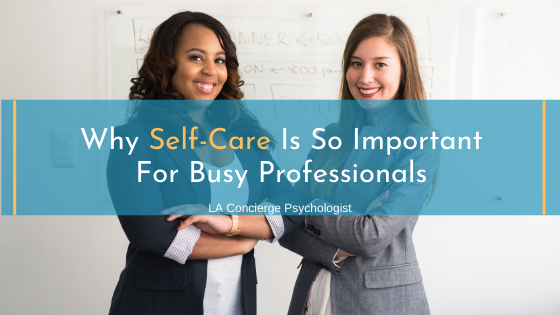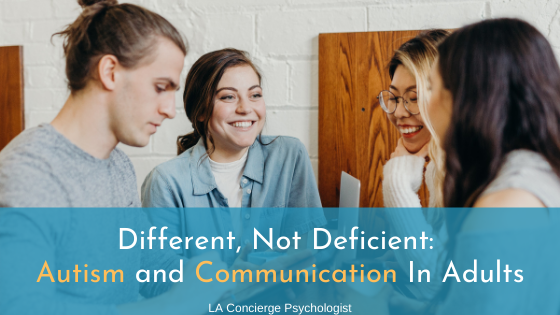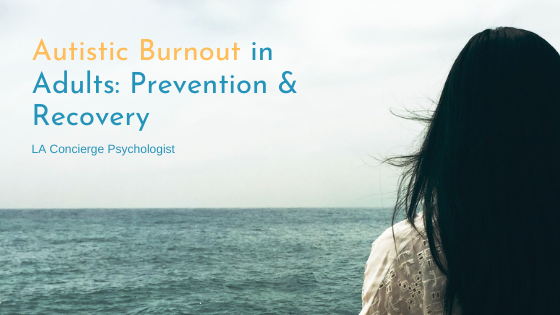5 Values That Improve Mixed-Neurotype Communication
Communication-related conflict is a normal part of all relationships. In our experience as adult autism therapists, it is equally prevalent in autism-affected romantic relationships. If you’re autistic—but your partner isn’t—you may be wondering how autism can affect communication in mixed-neurotype relationships. You may also be searching for ways to reduce misunderstandings that Learn More
How To Regulate Emotions As An Adult With ADHD
Anyone who’s ever heard of attention-deficit hyperactivity disorder knows that people with ADHD struggle to direct and control their attention. What’s not well-known is that ADHD can also cause difficulties in controlling one’s emotions, a condition psychologists refer to as emotional dysregulation. Clinical studies suggest that as many as 70% of adults Learn More
The Neuroscience Of Teenage Anxiety: Part 2
This three-part series on the neuroscience of teenage anxiety was inspired by Catherine Pittman and Elizabeth Karle’s book, “Rewire Your Anxious Brain.” Our last post introduced two regions of the brain involved with teenage anxiety: the cerebral cortex and the amygdala. This week, we explain how to recognize and manage anxiety that Learn More
How To Overcome College Anxiety This Fall
Thousands of California college students recently started fall classes. As they adjust to new schedules, workloads, and relationships, many face an increasing number of stressors in their lives. Ten tips for starting a new semester As therapists for college students, we teach young adults how to overcome college-related anxiety and manage other Learn More
The Neuroscience Of Teenage Anxiety: Part 1
A few months ago, I read a book by Catherine Pittman and Elizabeth Karle called “Rewire Your Anxious Brain.” This book takes a neuroscience-focused view of anxiety management. Reading this book has rekindled my interest in the biological side of anxiety, which doesn’t get as much attention as it deserves. Many anxiety Learn More
Autism-Friendly Career Development Advice For Adults
As adult autism specialists, we are often asked how to be successful with autism. Typically, our clients want to know what jobs are good for adults with so-called “high-functioning” autism. (Learn about why we don't use functioning labels) We agree that it’s essential to explore career pathways that play to a person’s Learn More
How To Build A Good Relationship With Your College Professor
Many undergraduates don’t realize how important the student-professor relationship is until they need something from their instructor. If you’re a college student, it might not have occurred to you that your professor can be much more to you than just the person who instructs you and grades your exams. If you have Learn More
Hyperfocus: A Common Symptom Of ADHD In Adults
Many people assume that ADHD involves a total deficit of attention. That assumption is reasonable since the term “attention deficit” is right there in the disorder’s name. The American Psychiatric Association describes ADHD as an inability to “give close attention.” If you observe someone with ADHD as they attempt to sit still Learn More
Practical Self-Advocacy Skills For Autism
This blog post—the second in a two-part series—describes three essential self-advocacy skills for autism. It provides practical examples of how to apply these skills in professional and personal situations. For a detailed introduction to this topic, read Part 1, “Why Self-Advocacy Is So Important With Autism.” Autistic people typically have very different Learn More
How to Get Accommodations in College for ADHD or Autism
In Part 1 of this series, we outlined the differences between ADA college accommodations and high school 504 plans/IEPs. In today's post, we provide a step-by-step explanation of how to get accommodations for autism and ADHD in college. Individualized education plans (IEPs) and 504 plans—which provide support for high school students with Learn More
Self-Care For Busy Professionals: Part 2
This blog post, the second part of a two-part series, offers doctors, lawyers, and other busy professionals advanced self-care tips to prevent burnout and increase life satisfaction. Read Part 1 for an introduction on why self-care is important and tips for fitting self-care into a busy schedule. As we explained in Part Learn More
What Is Working Memory? An ADHD Specialist Explains
Attention deficit hyperactivity disorder (ADHD) is characterized by an inability to control one’s attention. If you have ADHD, you might struggle to initiate or maintain focus on boring projects—even if you can concentrate on your favorite hobby for hours. This inability to control attention likely affects you in a wide variety of Learn More
Why Self-Advocacy Is So Important with Autism
This blog post—the first in a two-part series—defines self-advocacy and demonstrates why it is essential for autistic adults to learn this skill. See Part 2 for instructions on using this skill in your own life and for more self-advocacy examples. Allistic (non-autistic) people often make false assumptions about the needs, preferences, and Learn More
Why Self-Care Is So Important For Busy Professionals
This blog post, the first in a two-part series, describes why self-care is important for busy professionals and how to fit foundational self-care activities into a busy schedule. Read Part 2 for more self-care examples and advanced techniques. Burnout is pervasive among working people. Doctors, lawyers, and other busy professionals are particularly Learn More
How College Accommodations Differ from High School 504s/IEPs
This blog post—the first in a two-part series—provides examples of college accommodations that may be available for students with autism and ADHD under the Americans with Disabilities Act (ADA). Read Part 2 for instructions on how to request ADA college accommodations. As autism therapists and ADHD specialists, we speak with many parents Learn More
10 Strategies For Managing ADHD & Impulsivity In Adults
As ADHD specialists, we get a lot of questions about impulsivity and ADHD. If you have traits of attention deficit hyperactivity disorder or you were recently diagnosed, you may wonder what impulsivity means and whether all people with ADHD are impulsive. Let’s start with a basic definition and some examples of impulsivity. Learn More
Different, Not Deficient: Autism and Communication in Adults
Autism is often associated with communication problems in adults. According to the Diagnostic and Statistical Manual for Mental Disorders (DSM-5), autistic people have “deficits in social communication and social interaction.” It’s true that autistic people often struggle to communicate effectively with neurotypical people. Unfortunately, many people jump to the conclusion that autistic Learn More
What Is Executive Dysfunction? An ADHD Specialist Explains
Today’s post is on executive function/dysfunction. It will address common questions we receive on this topic, including, “Is executive function disorder the same as ADHD?” and “How can I improve executive function if I am an adult with ADHD?” But first, let’s start with a basic definition and some context: What is Learn More
Autistic Burnout in Adults: Prevention & Recovery
This blog post, which explains how to avoid and manage autistic burnout, is the second installment in a two-part series on autistic burnout in adults. Read Part 1—Autistic Burnout: What It Is & How Long It Lasts—for introductory information. As discussed in Part 1, autistic burnout can occur when there is a Learn More
5 Challenges Your Child May Face When Restarting College
If your child is planning on going back to college after previously dropping out, you may be both delighted and apprehensive. A degree could increase your child’s chances of landing a stable, satisfying career. At the same time, you worry that they might repeat the same mistakes or encounter the same obstacles Learn More
How To Manage “Overexcitability” In Gifted Teens
Is it hard for you to relate to your teen or tween child? Adolescents naturally have different concerns than adults. This makes it harder to empathize with them. For example, you might think your child's back-to-school wardrobe is perfectly fine as-is. However, your child might be mortified at the thought of wearing Learn More
Autistic Burnout In Adults: What It Is & How Long It Lasts
This post describes what autistic burnout is and how long it lasts. It is is the first in a two-part series on this topic. For information on how to avoid and manage autistic burnout, stay tuned for Part 2. It is slated for publication next month here on our blog. For autistic adults, Learn More
Launching Your Twice-Exceptional Young Adult’s Career
This article offers tips for parents who want to help their twice-exceptional (2e) young adult child launch a successful career. If you're unsure whether your child is twice exceptional, please read What Is A "Twice Exceptional" Teen? for common 2e traits. You can also read our article on home supports for 2e Learn More
10 Ways To Reduce Guilt & Anxiety About Saying No
There’s a cultural misconception that saying no is rude or selfish. As children, many of us were taught to be as agreeable as possible—even if that meant sacrificing our own happiness. Feelings of guilt and anxiety about saying no are probably universal, but women seem particularly vulnerable. Many women are so uncomfortable Learn More










